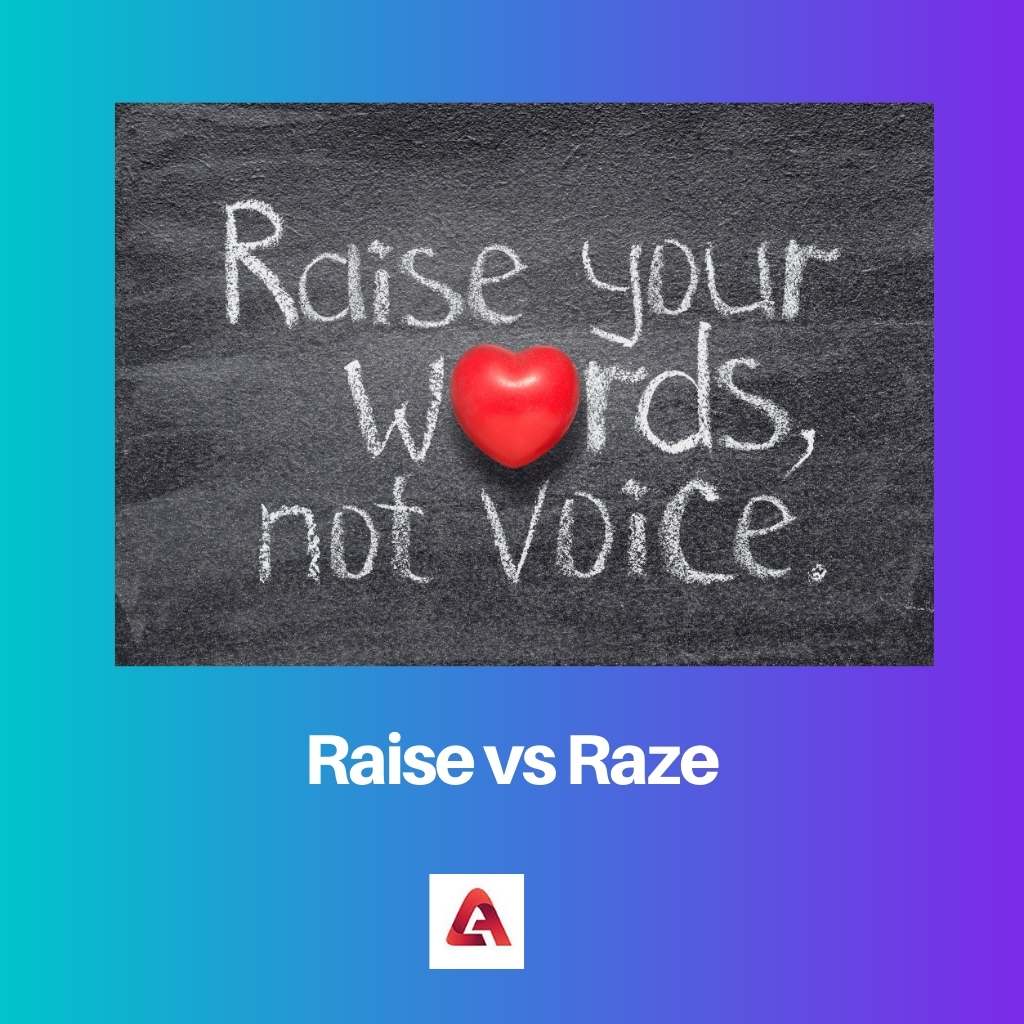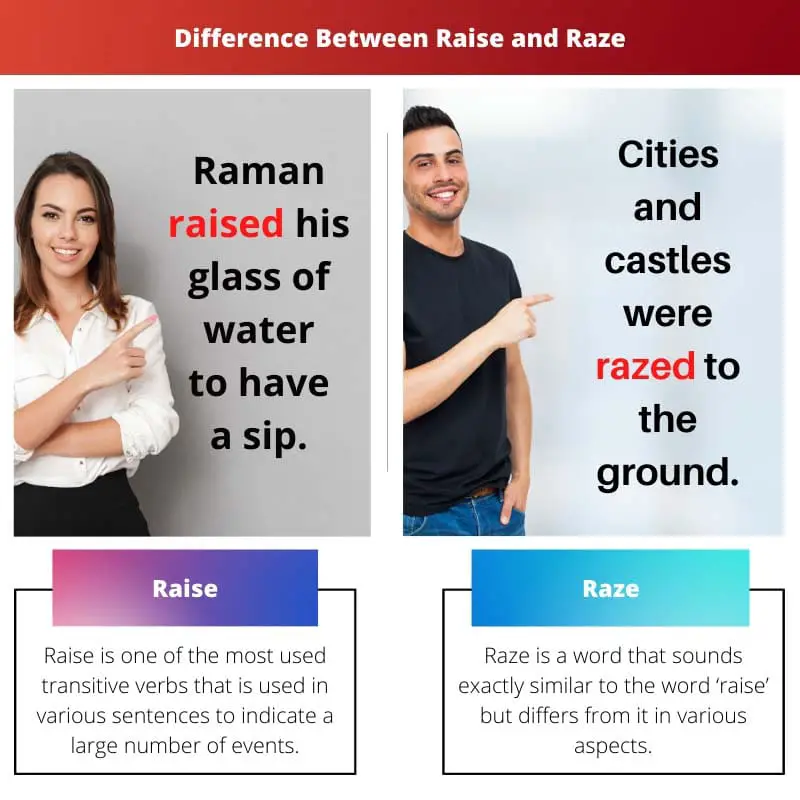A large number of words are termed homophones since they sound the same when spoken but have completely different and distinct meanings.
When pronounced, Raise and Raze are words that appear to be the same but have different meanings when used in various sentences.
Key Takeaways
- To ‘raise’ means to lift, elevate, or increase, while to ‘raze’ means to demolish or level to the ground.
- ‘Raise’ is used in construction or growth, while ‘raze’ pertains to destruction.
- In everyday language, “raise” is more commonly used, whereas “raze” is reserved for specific situations.
Raise vs Raze
Raise is an English term that is used in sentences to describe the situation where an object is lifted and increases the domain of an event or bringing up a person. Raze is an English term that describes the demolishing and destruction of different structures like houses, buildings, and bridges.

One of the major things to remember is that raise is a transitive verb, as it requires the support of another action to raise a particular thing. The word raise has a large number of meanings that can be interpreted in various ways.
Raze is a word that is not frequently used in sentences but indicates and refers to the process of destroying and demolishing a particular structure like bridges, houses, and buildings.
The word raze has a limited number of applications; hence not many people are aware of its usage.
Comparison Table
| Parameters of Comparison | Raise | Raze |
|---|---|---|
| Meaning | Raise is a common word that refers to lifting an object, bringing it up and helping it to grow, and increasing the scope of a particular object and activity. | Raze is an uncommon word that has a single meaning of destroying or demolishing a particular structure. |
| Number of Applications | There are a large number of applications of the word ‘raise’ as it can be used in various sentences. | The word ‘raze’ has limited applications as it has very few uses. |
| Synonyms | The synonyms of the word ‘raise’ are to lift, increase, and escalate. | The synonyms of the word ‘raze’ are to destroy, neutralize, and knock down a particular structure. |
| Nature | Raise is mostly used as a verb but can also be used as a noun in certain cases. | Raze is always used as a verb wherever it is used. |
| Examples | An example where raise is used is:- One of the major policies of this government is to raise the taxation slab for the higher-income class. | An example where raze is used:- The atomic bombing of Hiroshima by the Americans razed the entire district in a few minutes. |
What is Raise?
Raise is one of the most used transitive verbs that is used in various sentences to indicate a large number of events.
Raise is used in sentences for indicating an increase in the domain of a particular event, lifting a particular object, and bringing up an individual.
The word ‘raise’ has a large number of applications and uses in various sentences. One of the major features of ‘raise’ is its dual nature in that it can be used as a verb and also as a noun. Some examples where ‘raise’ is used to lift a particular object are:-
- Raman raised his glass of water to have a sip.
- Rahul has always raised the bar of this debate to another level.
Some instances where ‘raise’ is used to increase something are:-
- Heena requested the management to raise her salary so that she could meet her expenses.
- Teena warned Siddharth not to raise his voice against her.
Some examples where ‘raise’ is used to indicate looking after individuals and animals are:-
- Rita was raised by her grandmother after both her parents passed away in an accident.
- The red soil is not suitable for raising a large number of feeder crops.
What is Raze?
Raze is a word that sounds exactly similar to the word ‘raise’ but differs from it in various aspects. Raze is an uncommon word that means destroying, demolishing, and neutralizing various structures like buildings, houses, and bridges.
The various sentences in which ‘raze’ is used are:-
- The laborers completely razed the previous building to build it in a new style.
- Many monuments and heritage sites have been razed to the ground by the invaders that attacked India in the past.
- The bombing of Palestine by the army of Israel razed off the entire capital city of Palestine.
Yes, it is true that there are not many applications and uses for the word ‘raze.’ It is only used as a verb and not as a noun. The most popular synonyms of the word ‘raze’ are destroying, demolishing, and knocking down a particular structure.
Main Differences Between Raise and Raze
- Raise is one of the most common words that refer to lifting an object, bringing up an individual or animal, and increasing the dimension of a particular event, whereas raze refers to the process of destroying, knocking off, and demolishing a particular structure.
- The number of applications of the word ‘raise’ is numerous. On the other hand, the word ‘raze’ has few applications and uses.
- Lift, increase, and escalate are some of the popular synonyms of the word ‘raise,’ whereas destroy, demolish, and knock off are some of the famous synonyms of the word ‘raze.’
- ‘Raise’ is used in almost all the sentences as a verb and sometimes as a noun, whereas ‘raze’ is only used as a verb and not as a noun.
- The government is planning to raise the taxes on upper-class individuals is an example of the word ‘raise.’ On the other hand, Hiroshima was razed off by the bombings of the US is an example of the word ‘raze.’


The article showcases the depth of the English language and how words can be used in distinct ways.
The examples of ‘raise’ and ‘raze’ usage make it easier to comprehend the differences.
The article provides valuable insights into the differences between ‘raise’ and ‘raze’.
Kudos to the author for such a well-researched and informative article.
The usage of ‘raise’ and ‘raze’ is clearly explained in the article.
Yes, the author has done a commendable job in elaborating on these words.
I particularly appreciated the examples provided that help in understanding the context of these words.
This article is an excellent resource for those interested in language and semantics.
Great article, thank you for explaining such an interesting topic.
Indeed, understanding the nuances of words is important.
I agree, it’s a very informative article.
The comparison table is a helpful addition to the article.
Absolutely, it summarizes the differences quite effectively.